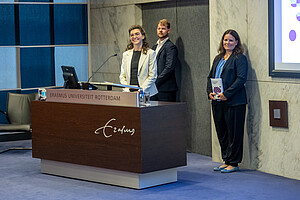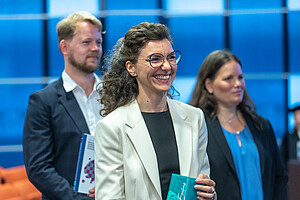PhD Defence Catalina Ratala

In her dissertation 'Behavioural and Neural Evidence for Processes Underlying Biases in Decision-Making' Catalina Ratala provided insights into how certain, seemingly trivial, aspects that pertain to the decision at hand can have a substantial impact on the final outcome, both in social and in consumer contexts. Catalina defended her dissertation on Thursday, 19 May 2022 at 13:00. Her supervisors were Prof. Ale Smidts (RSM), Prof. Alan Sanfey (Radboud University), and Dr. Maarten Boksem (RSM). Other members of the Doctoral Committee were Prof. Stefano Puntoni (RSM), Dr. Hilke Plassmann (INSEAD), Dr. Jan Engelmann (University of Amsterdam), Dr. Mirjam Tuk (RSM), Prof. Gerrit van Bruggen (RSM), and Prof. Tobias Kalencher (Heinrich Heine University).
About Catalina Ratala

Catalina Elena Ratala was born in Pitesti, Romania (1985). In her undergraduate studies at the Spiru Haret University of Bucharest she had a double major in Psychology and in Sociology. In 2009, she moved to the Netherlands to pursue a research master’s degree in Cognitive Neuroscience from the Radboud University, Nijmegen. Soon after her graduation she started her PhD research in decision neuroscience as a joint venture between the department of Marketing Management, Rotterdam School of Management and the Donders Institute for Brain, Cognition and Behavior, Centre for Cognitive Neuroimaging. As this was an interdisciplinary project, Cătălina conducted her research at the Donders. Throughout her PhD she presented her work at several international conferences, such as the annual meetings of the Society for Neuroeconomics, the Cognitive Neuroscience Society and Society for Subjective Probability Utility and Decision-Making.
Thesis Abstract

Every one of us makes numerous decisions every day. Regardless of whether these decisions are trivial (i.e., what to eat for lunch) or of substantial consequence (i.e., what job to choose), the process of choosing the most adequate option between alternatives involves weighing their different aspects, while considering our associated goals and expectations. However, this choice process can be subject to contextual influences, being affected by other factors except the decision-maker’s values, needs and goals: Decision-making can be biased.
The aim of this dissertation is to provide insights into how certain, seemingly trivial, aspects that pertain to the decision at hand can have a substantial impact on the final outcome, both in social and in consumer contexts. These studies emphasize three main points. First, the susceptibility of different types of decisions to the effects of contextual factors. Second, that such biases occur at different moments in the decisional process. Third, the advantages of multidisciplinary approaches in the study of value-guided decisions. By combining neuroscientific methodology with experimental manipulations, pharmacology, and self-report measures, this thesis showcases how questions relevant to social and consumer contexts can be addressed from different perspectives.
View photos of Catalina's PhD Defence
Photos: Chris Gorzemann / Capital Images


